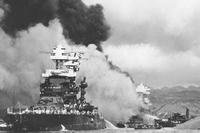Even though the Olympics were canceled in 1916, the Allied troops who had banded together to fight the War to End All Wars came together once more. This time, it was in the spirit of friendly competition.
With a few events that only soldiers and sailors could love, like the Tug of War and the Hand Grenade Toss, the Inter-Allied Games opened on June 22, 1919.
The sudden end of World War I in 1918 saw a huge number of healthy adult males lingering around Europe with little to do. Anyone who's ever seen the sort of trouble bored troops can get into can tell you they needed something to occupy their time.
"The Olympics of 1916 were scheduled to be held in Berlin in the midst of a war between the Allies and the Germans, so yeah, there was not going to be an Olympics," said National WWI Museum and Memorial Senior Curator Doran Cart. "But they really wanted activities for all these troops because they'd been so active and the war was over."
The Olympic Games were canceled for the first time ever in 1916 due to the war. After WWI ended, the Allied powers decided they would host their own international sporting competition in Paris. The YMCA funded a special stadium, which held 20,000 people.
Named for the commander of the Allied Expeditionary Force, Gen. John J. Pershing, the stadium would hold the first and only Inter-Allied Games.

In addition to the aforementioned military events, baseball came from the Americans and Canadians in North America and a rugby event came from Commonwealth countries. Of course, the universal Olympic-style track and field games were also included. The old favorites were also there, including boxing, wrestling and swimming.
The Central Powers were not invited to compete, but some of America's most notable college athletes were there. Former Olympian track and fielders Richard Byrd and Charlie Paddock took part, along with baseball legend Ty Cobb.
American troops nearly swept the competition in Pershing Stadium, both in individual sports and in the overall medal counts. Between June 22 and July 6, 1919, the United States racked up 18 winners and 17 runners-up. France, the closest competitor, brought home just one winner and two runners-up.
The Olympics resumed in 1920, and the Inter-Allied Games would be largely forgotten by history. They were overshadowed not just by the Olympic Games, but the return to normalcy that followed the Armistice and the return of troops to their homes.
"]The Inter-Allied Games were] covered in newspapers and everything, but really they all wanted to go home. Everyone went home," Cart said. "The world was tired of war, and everyone, including the competitors, just wanted to leave it all behind."
In case you were wondering, the gold medalist of the hand grenade throwing competition was an American soldier, Fred Thompson -- a chaplain.
-- Blake Stilwell can be reached at blake.stilwell@military.com.
Want to Learn More About Military Life?
Whether you're thinking of joining the military, looking for post-military careers or keeping up with military life and benefits, Military.com has you covered. Subscribe to Military.com to have military news, updates and resources delivered directly to your inbox.
















